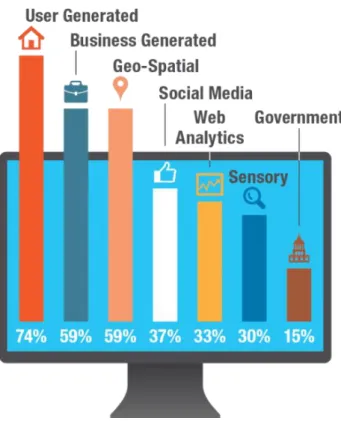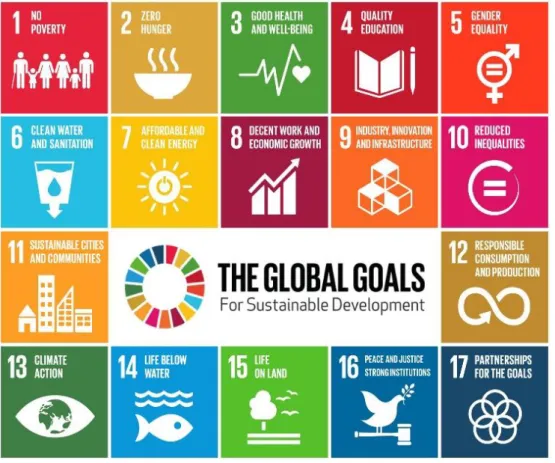The United Nations Sustainable Development Agenda for 2030, namely the 17 Sustainable Development Goals (SDGs), was created at a time when digital data is revolutionizing every aspect of life, in every part of the world. In this regard, harnessing the data to ensure smooth monitoring and fulfillment of the SDGs is inherent in their nature. This review looks for evidence on how opening up the data and making it available for free access and reuse could benefit the SDGs.
Μέσω συγκεκριμένων περιπτώσεων και αναλύσεων στόχο προς στόχο πιθανών εφαρμογών χρήσης ανοιχτών δεδομένων για βιώσιμη ανάπτυξη, καταδεικνύεται η σημασία τους για την παρακολούθηση της προόδου και την επίτευξη των ΣΒΑ και εντοπίζονται οι προκλήσεις για την αποτελεσματική χρήση τους και γίνονται σχετικές συστάσεις. Εξάγονται συμπεράσματα και υπογραμμίζεται η ευκαιρία για την Ελλάδα να ακολουθήσει αυτό το παράδειγμα. Το Open Data Institute (ODI) και η Partnership for Open Data (POD) που ανέπτυξε, συνιδρύθηκαν με την Open Knowledge και χρηματοδοτήθηκαν από το Development Grant Facility (WB DGF) της Παγκόσμιας Τράπεζας, έχουν στόχο να αναπτύξουν τη θεμελιώδη τεκμηρίωση του αντίκτυπου της χρήσης Ανοιχτά δεδομένα για ανάπτυξη.
Σημασία των ανοιχτών δεδομένων σε παρεμβάσεις που απαιτούνται για την επίτευξη των SDG
Αυτή η έκθεση, όπως και η έκθεση του UNSD "Έκθεση Στόχων Βιώσιμης Ανάπτυξης 2017", βασίζεται σε ένα προτεινόμενο πλαίσιο παγκόσμιων δεικτών που αναπτύχθηκε από τη Διοργανική Ομάδα και την Ομάδα Εμπειρογνωμόνων για τους Δείκτες Αειφόρου Ανάπτυξης (IAEG-SDGs) και εγκρίθηκε από τη Γενική Συνέλευση του ΟΗΕ.
Introduction
Purpose and Objectives of the Study
Methods
What are the SDGs?
No poverty - End poverty in all its forms everywhere
Good Health and Well-Being - Ensure healthy lives and promote well-being for all at all ages
Gender Equality - Achieve gender equality and empower all women and girls
Clean Water and Sanitation - Ensure availability and sustainable management of water and sanitation for all
Affordable and Clean Energy - Ensure access to affordable, reliable, sustainable and modern energy for all
Goal 8: Decent Work and Economic Growth - Promote sustained, inclusive and sustainable economic growth, full and productive employment and decent work for all
Goal 9: Industry, Innovation and Infrastructure - Build resilient infrastructure, promote inclusive and sustainable industrialization and foster innovation
Reduced Inequalities - Reduce inequality within and among countries
Goal 11: Sustainable Cities and Communities - Make cities and human settlements inclusive, safe, resilient and sustainable
Responsible Consumption and Production - Ensure sustainable consumption and production patterns
Climate Action - Take urgent action to combat climate change and its impacts
Life Below Water - Conserve and sustainably use the oceans, seas and marine resources for sustainable development
What is open data?
- How to collect the data?
- How to make data available (open)?
Open data is data that is made publicly available online by governments, organizations, businesses and individuals for anyone to freely access, use and distribute/republish. According to Badiee S.4, “open data is not just a result; it is a process that requires strategic planning and planting seeds for the future". There are two main categories of stakeholders related to open data: data providers and data users.
Of course, even if the data does exist, the least of these data sources are widely available and free, leaving a large amount of valuable data untouched. A good representation of the origins of data is a 2014 report on the dynamics and challenges of open data-driven companies in developing countries10, published by the World Bank Group. Government data in particular are of high value due to their nature, which implies that they cover the highest percentage of the target population.
A prerequisite for progress towards high-quality open data is the involvement of each country's national statistical systems. National statistical systems will be agents of change because they are uniquely placed at the center of a growing data ecosystem4. A comprehensive map of how open government data can be used for the common good is the Open Data Impact Map, a project of the Open Data for Development Network (OD4D), which brings together many organizations from around the world in one public database. that use this type of data.
Once the data is collected and made accessible for open and free use, the question arises "How to access and use the data". The data revolution presents new sources and users of data (whether from civil society or local government staff) who require training and empowerment to be able to engage in the process of accessing and using open data. to monitor the development and for it. Capacity building initiatives should be led by National Statistical Offices in order to have a centralized, common strategy that will result in interoperable and accessible data, ensuring reliable and comparable data and eliminating thus the main barriers to using open data for decision making.

Why data for the SDGs?
Data use should also be measured and case studies collected to better inform "data for impact" policies4. Ideally, data should follow a loop scheme whereby the data that is generated and collected is then published in open sources, from where it can be accessed by all and used to produce results, results and more data that will be from their side. collected and opened.
Why open data for the SDGs?
- Importance of open data for interventions required to achieve the SDGs
- Importance of open data for monitoring of the SDGs
Numerous sectors that have been addressed and benefited from the use of open data are directly linked to the 17 SDGs. Regarding Goal 2 (End hunger, achieve food security and improved nutrition and promote sustainable agriculture), Open Data can contribute significantly, mainly because of their inherent correlation with Earth observation image data. In addition, open data can even help farmers monitor water supplies and anticipate planting seasons that change with climate change.
Another application of open data for SDG 2 concerns the monitoring of child malnutrition worldwide, a process that requires access to sub-national data. Open data can help develop tools and apps that inform patients where to find healthcare providers and medicines, as in the case of Medicinia in Brazil. The recognized benefits of open data in education link it directly to Goal 4 (Ensure inclusive and equitable quality education and promote lifelong learning opportunities for all).
In addition, the open data application "CheckMySchool" in the Philippines or the example of opening data of the Fund for Operational Assistance to Schools in Indonesia show how open data can be used to fight corruption in school funding and ensure that education resources are spent fairly. An important aspect of the educational benefits of open data for gender equality is the fact that women can easily access health and public health data online that can improve their knowledge about sexual and maternal health. Water and sanitation are key issues for sustainable development and open data can work towards their protection, thereby avoiding the associated public health risks.
The path to Goal 7 (Ensure access to affordable, reliable, sustainable and modern energy for all) also intersects with the use of open data, as the latter can be leveraged to advise consumers on electricity supply providers with the best value on the market. The example of GuideStar illustrates how open data can benefit and develop relationships between non-profits and major international donors. For Goal 11 (Make cities and human settlements inclusive, safe, resilient and sustainable), open data can work by stimulating innovation in the way human settlements are organized, resulting in improved services, transport systems and architectural practices.
Finally, Goal 17 (Strengthen the means to implement and revitalize the Global Partnership for Sustainable Development) is based on open data. Open Data is essential for a number of organizations and initiatives that focus on sustainable development.
Challenges & Recommendations, Discussion & Conclusions
These countries must balance the needs of their own health information systems (HIS) with what is required from the SDG indicators, and seek to leverage the latter in serving the former. As a result, public-private partnerships (PPPs) are a prominent issue related to the spread of aggregation and use of open data. One of the biggest identified challenges for optimizing the collection and use of open data is the fact that data must be “demand-driven”.
There is general agreement that for the open data (especially those related to development) to become of higher quality, a base of evidence regarding its impact as well as the best practices regarding its collection and use must be formed. Case studies of specific implementation of open data uses should be carried out and their concrete results should be verified by quantitative or qualitative scientific studies. Timeliness of the data is another significant challenge to tackle, as for data to be useful it must be available quickly enough to ensure that the data cycle matches the decision cycle48.
In Greece, given the low satisfaction and trust within public services54 in the practices of the Greek government (compared to other OECD Member States) and the subsequent reduced trust in governance structures on the part of citizens, the culture of Open Data is desperately needed and is expected to bring about a shift in the relationships between citizens and institutions. The annual report on the decision and further use of Open Data56 shows the current state of affairs regarding the access to government data in Greece. Comparison with other countries (for example through surveys conducted by the Open Data Barometer) is important because it shows how the country needs to move to improve its practices and achieve the desired transparency, which is a fundamental goal of SDG 16, but also of the objectives that each sovereign state should set.
In the same report, partnerships with European and global initiatives, as well as participation in projects, are analyzed, showing the importance of joint work and the exchange of good practices for the realization of open data and open governance societies and for monitoring and achieving of sustainable development. for each country separately and for the planet as a whole. Advancing open data using technology, legislation, capacity building and partnerships is essential for its use to achieve the SDGs. A top-down framework, combined with a bottom-up approach, will deliver the desired results of Open Data for the successful achievement of the global 2030 Agenda for Sustainable Development.
Morrison A, Las Das P, New surveys reveal dynamics, challenges of open data-driven enterprises in developing countries, World Bank Group, 2014, available from: http://blogs.worldbank.org/opendata/new-surveys-reveal-dynamics-challenges-open -data-driven-companies-developing countries. Petrov O, Gurin J and Manley L, Open Data for Sustainable Development, World Bank Group's Transport & Information and Communication Technology (ICT) Global Practice, 2016. Gurin J, Manley L, Ariss A, Sustainable Development Goals and Open Data, World Bank Group , 2015, Available from: http://blogs.worldbank.org/ic4d/sustainable-development-goals-and-open-data.
NHS Efficiency Savings: The Role of Prescribe Analytics, Prescribe Analytics website: http://www.prescribeanalytics.com, accessed 05-01-2018. United Nations, Ministry of Economic and Social Affairs, Statistics Division, SDG Indicators website: https://unstats.un.org/sdgs/, accessed 05-01-2018. United Nations, Ministry of Economic and Social Affairs, Statistics Division, SDG Indicators database: https://unstats.un.org/sdgs/indicators/database/, accessed on 05-01-2018.
The Earth Institute, Columbia University and Ericsson, ICT & SDGs Final Report, 2016, available at: http://unsdsn.org/wp-. World Bank Group, Global Facility for Disaster Reduction and Recovery, Open data for resilience initiative: Planning an open cities mapping project, 2014.
